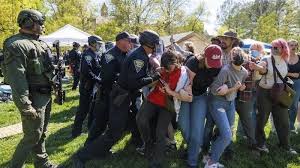
BLOOMINGTON – US colleges have been using law enforcement — along with academic suspensions and, for at least one school, expulsion — to warn against participating in violent pro-Palestinian demonstrations.

A central demand of many protests is that the universities divest their funds from Israel-linked companies and support a ceasefire in Gaza.
So far, many universities have refused to budge, and some experts doubt the effectiveness of such a campaign.
Over the weekend, students and children staged a display of solidarity at a demonstration in southern Gaza to express gratitude for the support seen on US college campuses in recent weeks.
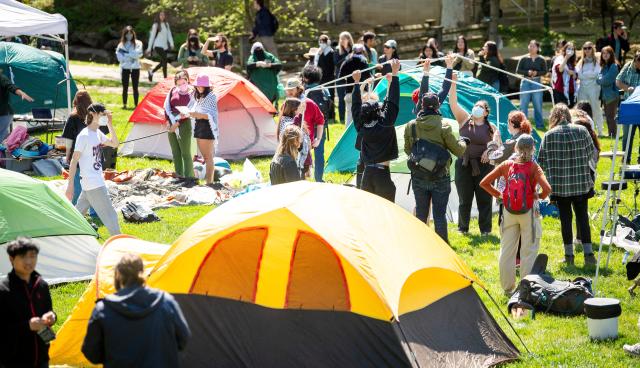
About 50 Indiana University Police officers and Indiana State Police troopers forcefully detained 23 protesters and took down the encampment at Dunn Meadow on the IU Bloomington campus. On Friday, April 26, the second day of protests, individuals warned numerous times refused to remove structures from university property were detained and removed.
Police say more than 30 protestors were arrested on Thursday while calling for a ceasefire in Gaza on the Bloomington campus.
Indiana State Police Superintendent Doug Carter said state troopers and IUPD officers were advised to give verbal warnings to anyone who would not tear down structures. Police met with university leaders the day before the protests and encampments were erected to put a plan in place. That same day, IU changed campus policy – temporary or permanent structures at Dunn Meadow must be approved before being placed on IU property. IU said the updated policy was posted online and at Dunn Meadow.
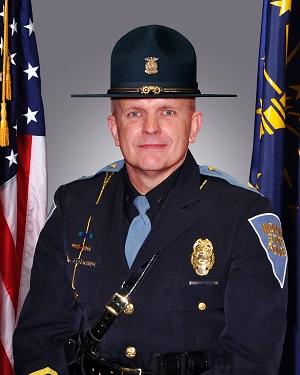
“I don’t understand the hate, but I do understand free speech and we will always allow a person to have the ability to do that,” Carter said.
State troopers and IUPD officers were advised to give verbal warnings to anyone who would not tear down structures.
“When we were asked to come in and assist them, that’s exactly what we did,” Carter added. “We didn’t come in mad. We were prepared for the unknown, but that’s what we do.”
Troopers will continue to work with the university and protestors as the encampment continues.
IU President Pamela Whitten and Provost Rahul Shrivastav released a statement Sunday evening addressing the IU Police Department and Indiana State Police’s clearings of pro-Palestinian encampments and forceful arrests of peaceful protesters.


In the letter, Whitten and Shrivastav said, “Put simply, the events of recent days have been difficult, disturbing, and emotional.”
Dear Members of the IUB Community,
Over the last several days, our campus community has faced considerable challenges and wrestled with complex questions. Put simply, the events of recent days have been difficult, disturbing and emotional.
Against that backdrop, we write today to provide you with an enhanced understanding of the university’s actions and to outline the beginning of what we believe can be a path forward.
First, our campus—like so many others—has experienced the escalation of a national movement on numerous college campuses to erect encampments and occupy universities indefinitely. Such un-regulated encampments raise concerns for us as stewards of the campus because they tax limited public safety resources and become magnets for those making threats of violence or who may not have the best interest of Indiana University in mind. Additionally, this movement also coincides with a troubling rise in antisemitism nationally and on college campuses. Specifically, antisemitic episodes have been linked to this national encampment campaign. It was in this unique context that we appointed the ad hoc committee and charged them to modernize our protocols for the presence of overnight structures in Dunn Meadow to address this contemporary issue.
Second, at the same time, our commitment to free speech is—and must continue to be—unwavering. Everyone has the right to peacefully rally or protest on our campus, and we will do our best to ensure that everyone can exercise these rights in a safe environment. Free speech on our campus will never be impeded. There have been no changes to the opportunities and rights for free expression on campus.
Third, in our decision to engage the IU Police Department and the Indiana State Police, we aimed to balance each of these concerns: legitimate safety concerns related to un-regulated encampments and our commitment to free speech. After standing down for 24 hours, we sought to give the protestors the opportunity to comply with policy, particularly the 1969 prohibition of tents after 11 p.m. They chose to expand the encampment after 11 p.m. Therefore, on Saturday we again made the decision to enforce university policy and remove tents and other temporary structures. The Indiana State Police provided the additional manpower needed to address heightened levels of potential threats.
This was not a decision we made lightly. Protestors were encouraged before and during the process of dismantling the tents to step aside to avoid arrest, and most did. They were also encouraged to remain in Dunn Meadow after the dismantling of the encampments to continue their protest, which most did.
Importantly, we encourage those members of our community detained for trespass to engage in the appeals process by contacting the IUPD. In nearly all cases, trespass ban orders preventing students or faculty from visiting campus will be halted during the appeals process. This will allow these students and faculty to complete the semester.
Fourth, we recognize that this is not the kind of action that any of us want to see on this campus moving forward. We will always prioritize safety for everyone on our campus. Yet, we are moving quickly to partner with faculty, staff, and students to look for long-term solutions. We are already in dialogue with members of the IUB community and are grateful to many who have offered their insights, counsel, and constructive criticism. Just this afternoon, Provost Shrivastav met with student leaders from Union Board and IU Student Government, as well as the President-Elect of the Bloomington Faculty Council, among others. With their insight, we are in the process of appointing a taskforce of student leaders and representatives of the Bloomington Faculty Council to review our event protocols and make recommendations to guide activities on campus, particularly in Dunn Meadow, moving forward.
In compliance with the existing policy, we have already received—and are in the process of approving—a formal request from a student organization to setup temporary structures in Dunn Meadow. This request will be contingent on a set of mutually agreed parameters. We anticipate the request to be approved—with the possibility of renewal—in 48-hour increments.
In closing, we offer our thanks to countless faculty, staff and students who have worked tirelessly to support free speech and ensure the safety of the IUB community. We look forward to and appreciate your continued engagement. It is our belief that conversations this weekend have laid an important foundation for ongoing and productive dialogue on our campus.
It is our hope that we can come together with our common desire to create solutions that will continue to strengthen the safety of our campus while protecting the rights of free speech.
Sincerely,
Pamela Whitten, President
Rahul Shrivastav, Executive Vice President and Provost, IU Bloomington
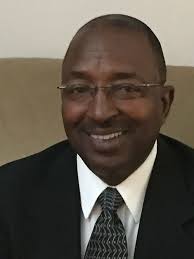
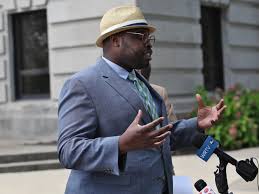
According to Jim Sims, 1st Vice President, and William Morris, Chair of the Legal Redress Committee, Monroe County NAACP denounces the arrest of peaceful protesters.
Whereas;
- Since 1968, the Monroe County Branch of the NAACP has opposed abuse of power and discriminatory practices in Monroe County.
- On April 25, 2024, Indiana University caused the arrest of over 33 arrests, with dozens more since then of peaceful protesters expressing their views in Dunn Meadow, an area designated for such purposes since 1969.
- IU purports to have changed its protest policy on the day of the arrests without due process or advance notice to those arrested, the IU Student Government, or the IU Faculty, manifesting a total disregard for the interests of those who make up the academic institution of IU.
- IU called in the Indiana State Police to carry out the arrests rather than utilizing the Indiana University Police Department, in whose jurisdiction these cases clearly fell.
- Calling in the State Police deprived the protesters of the benefits of the special training IUPD receives in de-escalating confrontations and working within the IU disciplinary process rather than seeking criminal prosecution.
- Those student protesters have been banned from campus without any opportunity to be heard, thus unjustly keeping them from completing their coursework and, in some cases, denying them graduation this Spring.
- All these acts violate student rights, civil rights, and human rights. They were carried out by an IU administration that now stands against the values of free expression and learning that have characterized Indiana University for over 250 years.
Therefore, the Monroe County Branch of the NAACP #3062:
A. Denounces the arrest of demonstrators under these circumstances.
B. In light of the gross violation of the protesters’ rights, demands that Indiana University:
- Immediately drop criminal charges against peaceful protesters.
- Immediately drop disciplinary charges against peaceful protesters within the IU system.
- Immediately rescind any peaceful protesters’ actions barring any enrolled students from campus.



